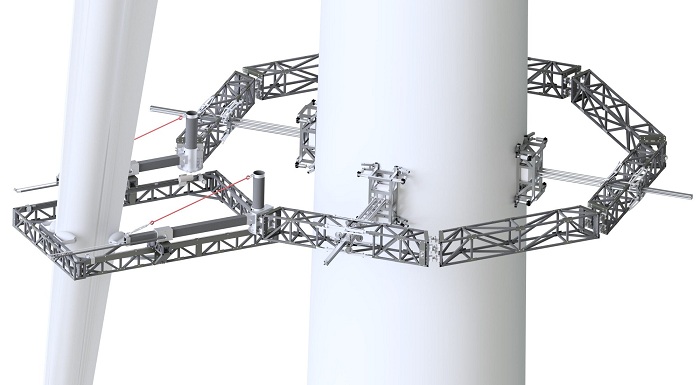Forth Engineering in Cumbria, is developing the RADBLAD technology which will complete a full X-ray survey of wind turbines for both offshore and onshore farms.
The lightweight robot will be capable of surveying a Vesta 47 size turbine and all its blades in just five hours. Forth’s innovation is in line with the UK government’s policy of increasing renewable power to bring all greenhouse gas emissions to net zero by 2050.
The UK is the world’s sixth largest producer of wind power, thanks to its offshore farms. With so many wind turbines, there is a high level of maintenance required across the industry with more blades needing checking for faults.
Currently, maintenance surveys are carried out manually by engineers climbing the wind turbine with rope access. Lives are being put at risk, with accidents and, in worst cases, fatalities.
There’s also a high financial cost to such inspections. Preventative inspection every three to four months and maintenance every six months is necessary, costing between £70,000 and £700,000 each, depending on the location and the size of the turbines.
Safer turbine surveys
To provide a solution, Forth is more than half way through a two-year project, funded by Innovate UK, to develop its RADBLAD technology.
The RADBLAD system is lightweight and portable and will make surveys safer, faster, and cheaper, removing the need to put lives at risk.
The differentiation elements of RADBLAD, when compared with other systems, is in the use of radiographic based in-situ inspection, the automatic detection of defects using an artificial intelligent (AI) based software, and the use of a modular approach for the robotic system.
The advantages of this system are early detection of blade defects, while reducing the risk to human operators. The manufacture of the technology is on course to be completed by the middle of July.
The RADBLAD technology has already been attracting interest from robotics and AI experts around the world and is set to be ready for testing on onshore wind turbines in September at Catapult Offshore Renewable Energy’s testing centre in Northumberland ready to deliver the solution in time for March 2021.
Peter Routledge, Forth’s programme manager, said: “RADBLAD is a world-first magnetically-adhering, wall-climbing robot, with a manipulator arm which deploys an x-ray system around a blade.
“A crucial and novel extension of RADBLAD lies in the use of a radiographic system for inspection and in providing an integrated solution that offers high-quality, efficient inspection method, which is human-safe.
“Unlike radiography, RADBLAD does not require costly, time-consuming onshore dismantling of blades and transportation to workshop, inspection in X-ray bays and return and reassembly, which can take around ten days, during which time revenue is lost due to generating downtime.”
The consortium involved in the project – Forth, Innvotek, TWI, Catapult, Renewable Advice and London South Bank University – has been able to press ahead with the work during lockdown.
Mark Telford, managing director of Forth, added: “This will be another world-first for Forth and another example of where an industry has a specific challenge and has asked us to come up with a solution. This is the way we like to work and if other industries are facing similar challenges we are always happy to talk to them.”





































